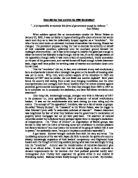Nigel Caunt 12:3 Tuesday 14th October
How Did The Tsar Survive The 1905 Revolution?
The 1905 revolution was a dangerous time for the Tsar of Russia at the time, Nicholas II. There was much unrest among the Russian people during the early years of the 20th century and many revolutionary groups were beginning to emerge as an immediate threat to the Tsar and his regime. The tsar had been the unquestioned autocratic leader in Russia for generations but the Russian people where getting tired of this way of governing one of the largest empires. They felt that they were beginning to become outdated in their ways compared to the western civilisations of Europe who had all now become democratic. Many people believed that in order for Russia to remain a strong country than a democratic system was needed to keep the provinces of Russia under control. Nicholas II however, felt that their was no need for change and had grown up under the tutor of Konstantin Pobedonastev who had taught the Tsar from a young age that the autocratic system was the best and that it should remain intact at all costs. Because of this talk of revolt became rife among many of the Russian people and the Tsar issued concessions in order to save his power as best he could. The fact that the Tsar survived shows that this “Revolution” was not actually a revolution at all as the leader was still in control. This was due to a great many reasons.
The Tsar made concessions to the people of Russia in a desperate attempt to calm the unrest that was building within the structure of his empire among all the classes bar the nobility. The nobility were not so much at unrest against the Tsar as they knew that without the Tsar in power they would loose the power they had over things such as the ownership of land and such things. This left all the other classes who were displeased with the leadership of the Tsar and how he was ruling their country. The concessions did calm much of this unrest among his people, but only for a short period of time. In these concessions he cancelled the redemption payments that the emancipation had created when the serfs were allowed to buy their land and pay the government the money over a period of 49 years. The cancellations of these payments were a bid to settle the unrest among the peasant class, as this was one of their main concerns with the bureaucracy at the time. Corporal punishment was abolished which pleased many people as many thought that this kind of treatment was inhumane for the times. The soldiers were at unrest as well with the Tsar due to their pay and living conditions. To solve the problem of his army staging a mutiny against him he was quick to put in the concessions that they were to have improved pay and living conditions and were to generally be treated better during their time in service. The army was the biggest priority for the Tsar to sort out I feel because the army were his ruling force. In an autocracy such as Russia’s at the time, the army is what the tsar used to enforce his laws around the empire and without his army he would have a very difficult time staying in power. The freedom of religion was given to the people and so they were no longer apprised. The education system was also to be improved which meant that their were now more peasantry with the ability to read and write. There was the consolidation of the land for the peasants which meant that they were given large areas of arable land as appose to lots of smaller sections as this was thought to be less efficient and the land would be variable in different locations.






